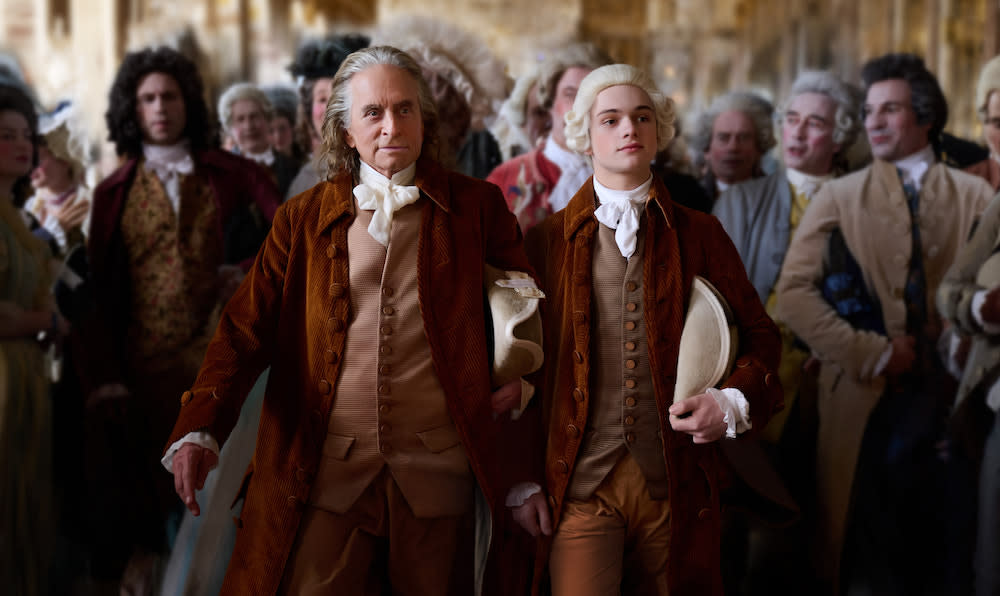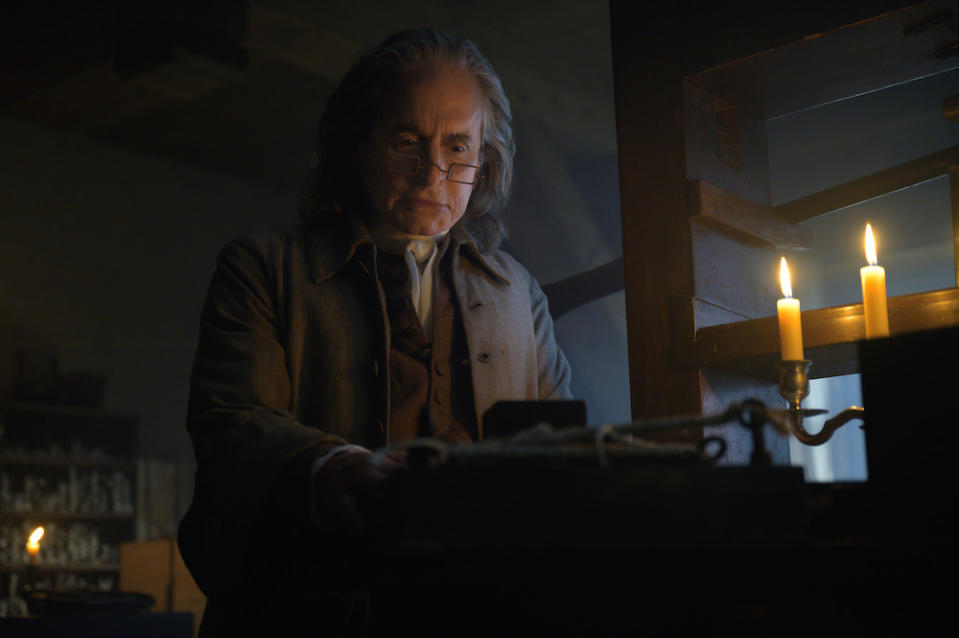‘Franklin’ Isn’t Very Good. What It Represents Is Worse.

- Oops!Something went wrong.Please try again later.
- Oops!Something went wrong.Please try again later.
Two of America’s founding fathers are fed up. Aside from their shared belief in a bold new experiment called the United States, Benjamin Franklin (Michael Douglas) and John Adams (Eddie Marsan) don’t often see eye to eye, and their conflicting visions have only strayed further during negotiations with France. Adams doesn’t see the point in spending so much time catering to one European king while they’re trying to assert their independence from another. Franklin knows the path to freedom comes with tolls that only the French can pay. But more to the point, he knows the French. He knows their customs, their language, and their comportment. Adams’ attempts to speak French are almost as disastrous as his impatience with their languid dealmaking, and after an unnecessary setback, his co-emissary tries to warn him.
“Your notion of diplomacy will be our undoing,” Franklin says. “America cannot suffer anymore of this slow, silent, imperceptible creeping!” Adams snaps back. And then Franklin says the quiet part out loud. “The art here is to achieve much by appearing to achieve little.”
More from IndieWire
The sentiment, which has been spoken many times in many different iterations across many hours of the Apple TV+ limited series, applies as much to France’s dilatory diplomatic process as it does to “Franklin” itself. The eight-part historical drama moves at a snail’s pace. Countless scenes are devoted to backdoor bartering where so little progress is made, it’s as if the only deal struck during each meeting is that everyone will pretend there was no meeting in which a deal could’ve been struck. Franklin spends his time attending Parisian dinner parties, operas, and political gatherings, all while everyone pretends he’s not in Paris at all. “What about me? Do I exist?” he asks in the third episode. “You exist in Bastille,” he’s told, “but not in Paris.” (A favorite line in this infuriating string of contradictory dialogue: “This is no time to discuss whether we know what we know!”)
If told with style, humor, or purpose, a factual fish-out-of-water story following Benjamin Franklin and his grandson, Temple (Noah Jupe), could’ve, in theory, proven entertaining and enriching. Instead, “Franklin” comes across as an apathetic history lesson, too content in its embodiment of French decorum to be bothered explaining why audiences of any country should care.
Are we meant to be left with a better understanding of Franklin himself? If so, the takeaways are generic character tropes: He’s a brilliant strategist, no one can see the chess board like he can, and yet he’s also got a weak spot for booze, food, and ladies — not quite a revolutionary portrait.
So perhaps it’s his mission that matters, instead? Matter it did, but “Franklin” still feels like a footnote to a larger, more significant story. As glad as I am to avoid another boilerplate biopic spanning the title character’s entire life, his eight years in France never feel as important to winning the Revolutionary War as the actual war itself. Nor do tangential scenes about his printing press and glass harmonica do much to convey what makes him a unique and beloved public figure (although they do give Douglas something to do besides talk, sit, and drink).
Perhaps “Franklin’s” failures to distinguish its subject and story wouldn’t sting so much if its creative team didn’t have such an impressive track record. Co-writer and executive producers Kirk Ellis wrote the bulk of “John Adams,” HBO’s 2008 limited series that went on to win 13 Emmy Awards. Director Timothy Van Patten is TV royalty, a 15-time Emmy nominee and two-time winner who’s been behind the camera for “The Sopranos,” “Sex and the City,” “The Pacific,” “Boardwalk Empire,” and “Game of Thrones” (not to mention the flat-out gorgeous “Perry Mason” reboot). All of those projects, you may have noticed, are HBO originals, and each of them premiered when Richard Plelper was still the network’s chairman and CEO.
Now, Plepler runs EDEN Productions, which has a five-year production deal with Apple TV+. He’s an executive producer on “Franklin,” reuniting with Ellis, Van Patten, and other key crew members to bring a little of that old HBO shine to Apple’s burgeoning library. You know, the level of quality that made people remember the slogan, “It’s not TV, it’s HBO”; the bold creativity that was once synonymous with the term “original” programming; the approach to television that resulted in a little project called “Behind the Candelabra.”

From the outside looking in, comparing “Franklin” and the 11-time Emmy winner couldn’t be easier. There’s Michael Douglas, playing a real-life figure, in a prestige adaptation of a well-received nonfiction book. Plepler’s presence at Apple only strengthens long-standing theories that Apple TV+ is the new HBO. In both projects, Douglas plays a larger-than-life figure who the audience comes to know through a naive young companion. (In “Candelabra,” it’s a jilted lover played by Matt Damon, while in “Franklin” its Ben’s grandson played by Jupe.) One could even argue that both projects foreground the younger perspective (and audience proxy) over Douglas’ famous figures, but once we start digging into what ends up onscreen, the comparisons cease — as do the results.
When “Candelabra” debuted, it was a sensation. Cannes rolled out the red carpet for Steven Soderbergh and his stars. HBO earned the highest ratings for a TV movie in nearly a decade. The awards rolled in from its spring launch through the following winter. Critics, fans, seemingly everyone adored it, and it’s remembered fondly to this day.
“Franklin” will not be a sensation. It dropped quietly on Friday between buzzy premieres of Amazon’s big-budget video game adaptation, “Fallout,” and HBO’s own awards-friendly limited series, “The Sympathizer.” Apple won’t release ratings (it never does), and I can’t imagine experts expect to see “Franklin” pop up on Nielsen’s streaming charts. It faces stiff competition at the Emmys, not only from “The Sympathizer” and HBO’s other contenders (“The Regime,” “True Detective”) but also Apple’s “Masters of Air” and “Lessons in Chemistry.” (All of which may end up falling to “Shōgun.”) Reviews, by and large, have not been kind.
There are plenty of unavoidable reasons for “Franklin” falling short of its spiritual predecessor, not the least of which is that even under the best conditions, lightning doesn’t tend to strike twice (something Ben Franklin would know a thing or two about). Anticipated TV shows disappoint all the time, in part because making good, let alone great, series is immensely difficult. Plus, in an audio-visual medium, Ben Franklin will never be as exciting a subject as Liberace.
But looking at the state of TV then vs. now, it’s hard not to get frustrated over what could’ve been. Many of “Franklin’s” problems are far too common across an adrift entertainment industry. Should this eight-episode series have been developed as a movie, in order to cut down on repetitious scenes and accelerate an all-too-sluggish pace? Perhaps, but TV movies don’t really exist anymore, and where’s the market for star-driven historical epics if not at Apple? Should we invest in fresh new ideas from exciting new talent? Of course, but that’s not happening enough. As studios’ risk-aversion ramps up, they’re much more comfortable producing what audiences have seen before, and they’re similarly happy — in a world where everything is either I.P. or potential I.P. — to tell segments of stories instead of the full thing, just in case success demands continuation.
Last year was a rough one for television. This year has unearthed a number of gems, but the future’s trajectory remains murky. Now is not the time to get lost in the past, but there’s something to be learned from what separates past successes from present failures. Too many of TV’s modern artistic endeavors only appear to achieve much, when they’re really settling for so little.
Grade: C-
“Franklin” premiered Friday, April 12 on Apple TV+ with three episodes. New episodes will be released weekly through the finale on May 17.
Best of IndieWire
Sign up for Indiewire's Newsletter. For the latest news, follow us on Facebook, Twitter, and Instagram.

